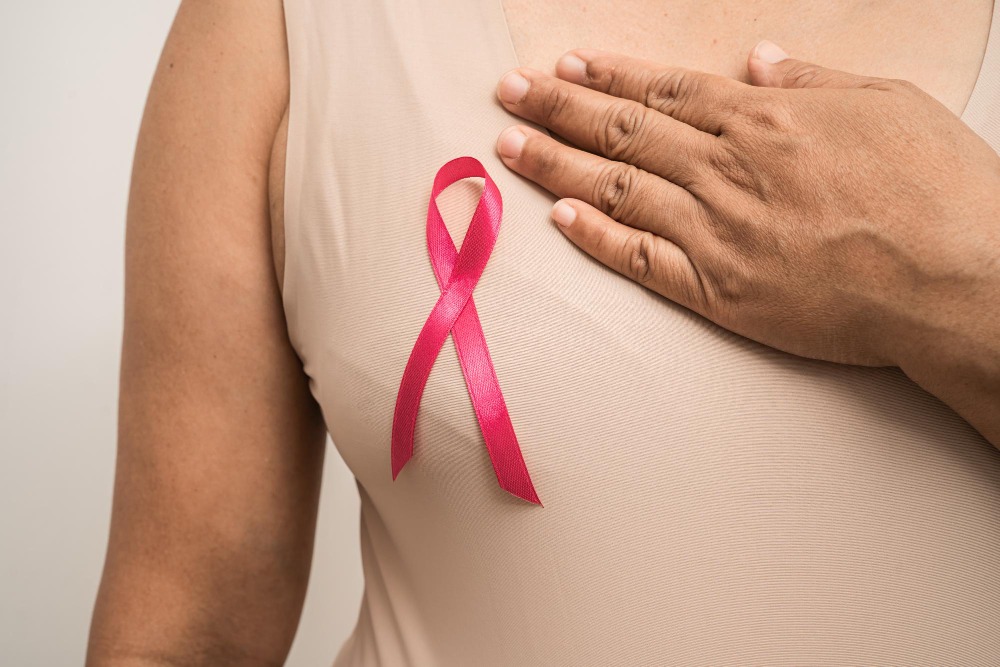An increasing percentage of the Indian population is seen to be suffering from different types of breast cancer. Almost 40% of the population is affected by this and what is worrying is that many women are below the age of 50. The main issue in India is a lack of awareness about the signs, symptoms, and risk factors and it is not understood by most of the populace that cancer is treatable too. Many people associate it with a death sentence, while others cannot afford treatment and hence just waste away. Let us learn more about the risk factors which can increase our susceptibility, the various symptoms to watch out for and the types of cancers, along with some tips for prevention of breast cancer.
The Symptoms To Watch For
Keep a close watch on yourself, and examine yourself every month once you are 40 years of age or even from today if there is any family history. Look for these-
● Your nipple and breast need to feel normal and look like that too.
● If you can feel a lump of hard-ish tissue in your armpit or on your breast or there is any patch of skin that feels different than usual to the touch.
● Any change in colour needs to be checked soon.
● If the skin on your breast or nipple looks especially flaky, crusty or scaly, then promptly get it looked at.
● The nipple must not turn inward. If it does, then you should get it checked.
The Different Types Of Breast Cancer To Know About-
Breast cancer is just a term used to describe a variety of cancers that can affect the mammary tissue in the body. It can affect both men and women though women report a higher number of cases due to a variety of reasons. Some of them are-
● Triple Negative Breast Cancer
● Invasive Lobular Carcinoma
● Inflammatory Breast Cancer
● Invasive Ductal Carcinoma
● Ductal Carcinoma In-Situ
● Paget’s Disease
● Metastatic and Invasive Breast Cancer
The Risk Factors You Should Prevent-
Genes are the major source of faulty cancer-causing instructions. So any family history of cancer can mean you may be at risk too. There are many idiopathic cases too which can be attributed to the following risk factors-
● Ageing itself is a problem. Our cellular machinery and DNA replication do not operate accurately and there are errors which can happen. These cells can hence have faulty DNA and give rise to more such cells which is ultimately how tumours form.
● If you have never been pregnant or never breastfed before, you are at a higher risk than usual.
● Menopause can cause cancer in many women due to global hormonal shifts that happen rapidly.
● Exposure to smoke, smoking or drinking alcohol can all be problematic.
● Having dense feeling breasts- which means a mammogram will not be able to accurately detect what is going on inside.
● If you have gotten your periods earlier (precocious puberty) or ger menopause much later than 55 years of age, then you are at risk too.
● Not exercising enough and being obese can also be risky.
Conclusion- The global average for this year is around 360000 new cancer cases. Everyone needs some basic information about what breast cancer is, how it can happen, the risk factors associated with it and its different types. Also, it needs to be well-known that early detection is key to a better prognosis. When cases are found in the initial stages, these individuals go on to survive and live long lives after appropriate treatment most of the time. Self-awareness begins with knowing what a self-examination is and then doing it properly. So, go ahead and give yourself a squeeze every now and then. It is good for you.
FAQs-
1) When is World Breast Cancer Day celebrated?
It is an annual celebration on 16 October, though other days are also present which highlight specific types of cancers or vulnerable populations.
2) Is cancer preventable?
Not really, but you can learn to watch out for some warning signs. You can seek treatment quickly, which will help you in the long run.
3) Are there any campaigns in India that support this cause?
Yes, SBI, Tata Trust, some hospitals and campaigns by the Cancer Foundation of India aim at helping people understand what breast cancer is, how it can be detected earlier and letting them know that treatment is very much available.
4) Are there any ways to prevent cancer from occurring at all?
Yes, apart from regular physical examination of the breast tissue, if there is a high likelihood of suffering from cancer due to the presence of some faulty gene, chemoprevention therapy can be given or by using monoclonal antibodies that target HER2 cells specifically.
5) What are the treatments available now?
You can go for chemotherapy, hormonal therapy, radiation or biological therapy and even get a mastectomy (surgical removal of breasts), but the mode of treatment is decided by the physician after due consultation with you and takes into account the severity involved.




